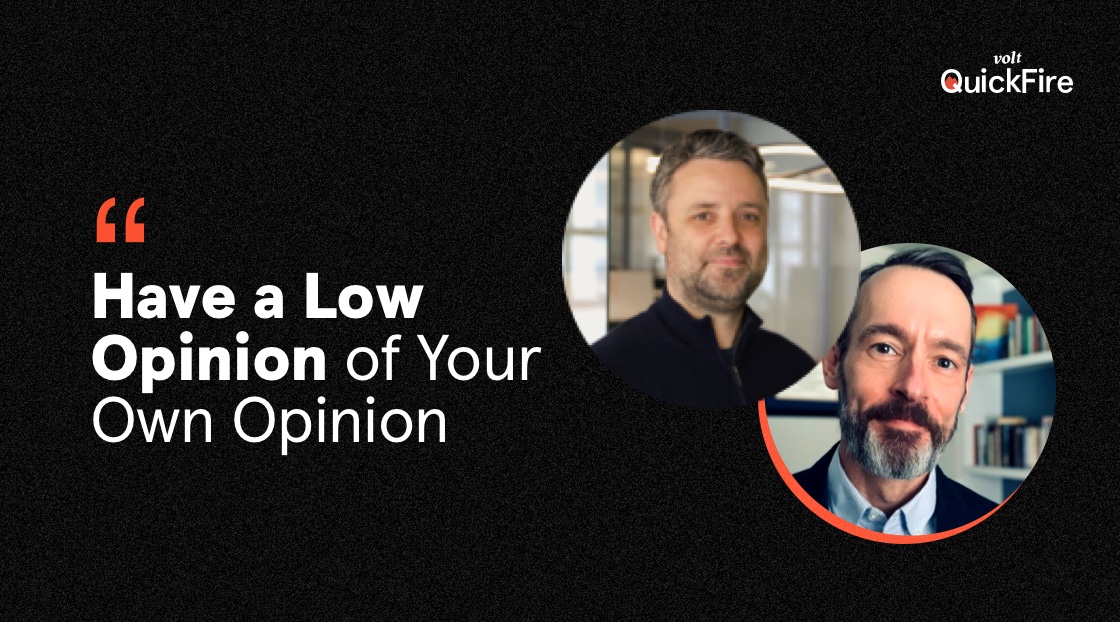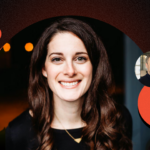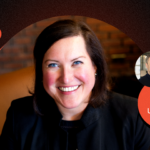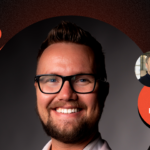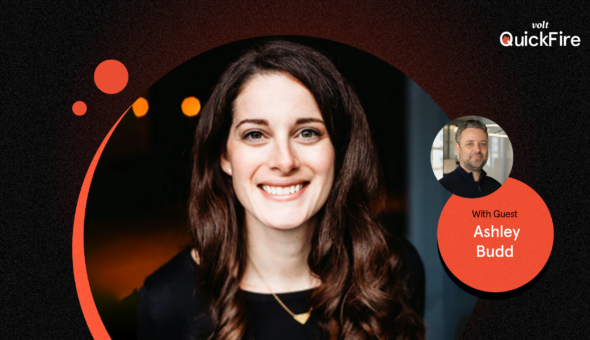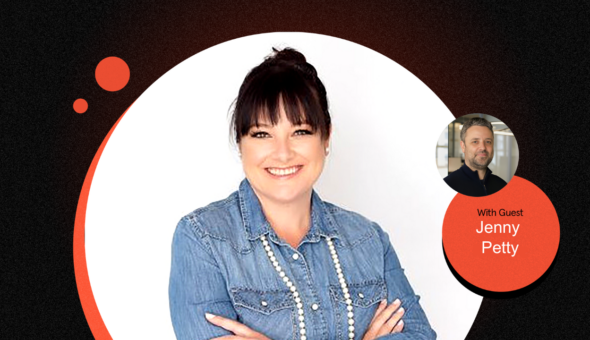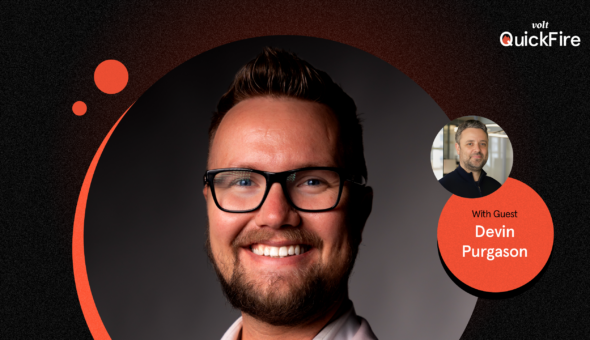Read the full transcript here
Kevin Renton:
Hi there. My name’s Kevin Renton and welcome to QuickFire from Volt. This is where we put higher education marketers on the hot seat and fire them 20 rapid questions to see what makes them tick, what makes them successful, and what their goals are for the future.
In the crossfire today, we have Jason Hughes, the VP of Marketing and Recruitment at Semester at Sea. Welcome, Jason.
Jason Hughes:
Yeah, thanks for having me. I’ve watched a lot of these, so excited to be here.
Kevin Renton:
Great. So softball question to begin with, give us your elevator pitch. What do you do at Semester at Sea, your title, your bio, and your day-to-day?
Jason Hughes:
I’m Jason Hughes. I’m the Vice President for Marketing and Recruitment here at Semester at Sea, and I’ve been here for 13 months. I oversee our enrollment division, university relations, as well as marketing communications. I have some great colleagues here who do that.
Semester at Sea is a 60-year-old study abroad program that’s very distinct. We take students on two semester-long voyages to 10 countries on three continents each fall and spring, so that means I have a pretty exciting day-to-day here.
Kevin Renton:
I wanted to work in higher education because?
Jason Hughes:
I wanted to work in higher education because of the transformative experience I had as a student, and I think that’s true for a lot of us who do this. But I was a first-generation college student who really got to the end of my undergraduate experience and finally looked around and sort of realized all the doors I had been pushed or led through.
It just really dawned on me, gosh, this was very intentional. All the things I got out of this experience were cultivated for me and introduced to me. So while I went to work outside of higher education for a little while, I thought, “I want to live in that. I want to be a part of helping students have the kind of experience I had,” but here I am.
Kevin Renton:
The marketing tool I can’t live without is?
Jason Hughes:
As I said, I’ve listened to a lot of these and I’m always writing down what I hear other people say, so maybe I won’t be quite as helpful, but certainly Trello, Canva, GA, those kinds of things are all really valuable to me, but honestly, the marketing tool that I use most and rely on the most are really books. Books and LinkedIn Learning, those kinds of things. I’m constantly pulling things off the shelf and learning more, and it really helps me in my day-to-day.
Kevin Renton:
Do you keep reference books that you always go back to?
Jason Hughes:
I do.
Kevin Renton:
Yeah.
Jason Hughes:
Yeah. Yeah, I’ve got this habit. I was just doing this this morning, looking on the inside cover of a book I read a couple of years ago at my notes. So I own those books, when I read them I mark them up and go back to them for reference later, yeah.
Kevin Renton:
Yeah. It’s funny, ’cause that’s what I do as well.
Jason Hughes:
Oh, yeah?
Kevin Renton:
I have this bunch of books behind me and they’re all marked up, and I pull them off the shelf every now and then.
Jason Hughes:
I’ve learned even if I read them at the library, if I really take something away from it, I’m going to have to go back and get my own copy so I can do that.
Kevin Renton:
Okay, my biggest professional mistake was?
Jason Hughes:
I’ve had a lot of them, but I think the consistent theme is just forgetting to ask permission, forgetting to collaborate, forgetting to be transparent. Over the course of my time in higher education, it’s really been that. It’s so easy when you’re trying to move forward and you’re trying to do things quickly to forget that you just have to keep working with people. You keep having to have an open dialogue.
So when I forget that, I’ve paid the price I admit in lots of places, so I try to remember to keep being transparent, keep having those conversations, keep asking for more people to be involved in the work, and that’ll help me avoid those pitfalls.
Kevin Renton:
When I’m not working, I’m?
Jason Hughes:
Well, I’m here in Fort Collins, Colorado, so when I’m not working, I’m up in the mountains hiking or skiing or camping with my family, or I admit I spend my evenings walking with my wife down to our community garden spot. So, weeding is the other answer to that question. I spend my time weeding.
Kevin Renton:
I start my day weeding at?
Jason Hughes:
Yeah. Oh gosh, I might not get up as early as I do if I started off weeding, but I usually get up at 5:00 a.m. I do that because I’ve always found that to be that quiet time in my house. So I get up and I read and I exercise, and I’m getting old enough now that if I don’t do both those things first thing in the morning, the rest of the day doesn’t go quite as well, the brain doesn’t work quite as well. So that’s what I do out of necessity, I get up pretty early.
Kevin Renton:
The secret to a student succeeding at my school is?
Jason Hughes:
What makes a student successful on Semester at Sea is really sort of showing up for everything everywhere all at once. Just really being open to all the experiences, open to having breakfast with your professor and their family that’s going to be on the ship. Being open to expanding your horizons, to asking questions when you’re in country for four or five days, for being brave and stepping out there and doing things maybe that you’re a little uncomfortable about.
I think that’s really the secret sauce for our program, and I think students, they seem to sign up with that. If they don’t sign up with that, they seem to catch the fever for really being open to what the world is going to offer them on our voyage. So, I think that’s pretty exciting and that was really eye-opening for me.
Kevin Renton:
I admire the marketing at?
Jason Hughes:
Like everyone, I think I admire the marketing at Patagonia and Apple, Starbucks, these places, but I also really admit that I pay close attention to what places like Taco Bell and Raising Cane’s and others are doing. They’re targeting our market and they’re doing some really interesting things. So even though I don’t eat at Taco Bell as much as I did as a college student, I pay close attention to what they’re doing.
In higher ed, also I think like everybody else, I pay pretty close attention to what Purdue’s doing, what Arizona State’s doing, these brands that have really pulled on this coat that they wear so reliably and so well, so there’s a lot to learn watching them.
Kevin Renton:
The biggest challenge facing higher education marketers are?
Jason Hughes:
It’s the shaky confidence that I think the general public has in the value of higher education experience today. We’ve been facing that for years, but I think it’s certainly that biggest challenge for us. Every other week it seems like there’s a report about public confidence in higher education being down.
There was a story, I think it was last week in The Wall Street Journal about costs spiraling out of control on campuses. I think we’re all dealing with that, and those of us who work in higher education understand what value there is, and our students I think very often do too. But that public dialogue continues to persist, and I think it’s something we have to confront.
The other thing that I’ll say maybe selfishly that I hear a lot about, particularly because of some of the folks that I follow, is this dialogue about the biggest brands being the only brands for students in higher education.
I attended the University of North Carolina in Charlotte, I went to Central Michigan University. I served places like the University of Northern Colorado and I know how much students get out of those institutions, but yet there’s loud voices out there saying, “If you’re going to go, if you’re going to invest, then you need to go to that big brand, that flagship university, the Ivys,” those kinds of things.
As we all know, the majority of our students do not go to those institutions and they get a fantastic training and introduction to the world in other ways. So that’s two challenges I admit, but I think they’re kind of related.
Kevin Renton:
Yeah. My favorite social media channel is, and why?
Jason Hughes:
I’ll just say Facebook, to be honest. I’ve lived in a lot of places, I have friends around the country, family around the country, and I admit, I got on this morning with my coffee and was seeing all these pictures from around the country of kids going back to school. I still rely on Facebook, I’ve not given up on them yet for that reason. So while I think our best media dollars are spent with TikTok and Snapchat, Facebook is really the one that is most valuable to me.
Kevin Renton:
My biggest professional achievement is?
Jason Hughes:
I’ve been a part of fantastic teams at a variety of places and was able to contribute to big enrollment wins at a bunch of institutions, do some really foundational brand work as well, but I always refer back to an experience I had at Northern Colorado when I was there when I had a team, and we worked really closely with the admissions office to really reimagine our visit days.
It sounds like a small thing, but it was. What our goal was as a division was to really just change how productive and experienced that was for students, and to make sure that 90% of the students who hadn’t applied already when they attended had applied before they left.
That was an event that took months to prepare for, that we completely redesigned. Every member of my team had a hand in it, and we were all sort of high-fiving each other and the admissions counselors at the end of that event, so it was really a huge success. Maybe it wasn’t earth-shattering, but for us it was huge, and it’s always that thing I look back at and think, I want more of that. How can I get some more of that kind of experience?
Kevin Renton:
The future of higher education will be?
Jason Hughes:
I think it’ll be lifelong and lasting. I think all of us in higher education really do need to meet that need for lifelong education. There’s so much out there, it’s so easy to sort of cultivate your own curriculum these days. I realize that, but I do think we all want to look back at our alma maters and see them playing a role in bringing that forward. Not just through paid degree programs, but through just cultivating the kind of information and maybe even the dialogue that we find valuable.
I studied as a journalism student, and so I’m mindful of the fact that I think a lot of people aren’t using their daily newspapers that way anymore, and I think there was a time that they did. I think higher ed’s got an opportunity to sort of play that role in the future with their graduates and their communities too.
Kevin Renton:
How do you think Semester at Sea fits into the future of higher education? ‘Cause it is a different experience. And do you think students are now looking for more of an experiential aspect to their journey or their learning journey?
Jason Hughes:
Yeah, thanks for that question. I found that we are a really compelling offering for students, because … for example, one thing is students get on our ship and they say, “Oh my gosh, my phone doesn’t work.” I mean, that really happens, right?
Kevin Renton:
Yeah.
Jason Hughes:
So I went to school in the ’90s, they have a very ’90s experience on the ship, and that leads to much stronger relationships with their peers, with the crew, with the staff and faculty that are on the ship, and that’s really powerful.
Internships have really taken off in higher education in the last 20 years too, and we talk about buckling on and these certifications and things like that. I think Semester at Sea is one of those things that a student who really wants to get the most out of this one phase of their life really should tack on.
There are other ways to do that. You can do Outward Bound, you can do other study abroad programs of course, but I do think that’s important, and I think that’s probably part of the future of higher education overall too, is facilitating those kinds of extra experiences while students are having that transformative four year experience.
Kevin Renton:
The key to my success has been?
Jason Hughes:
Always having a low opinion of my own opinion, I think that’s it. If you really are in the business of trying to reach students, you need to recognize that you probably don’t know how to get there, but that the young people that work in your office or that you bump into on campus or on the ship are going to be able to tell you, “This is what I really want, this is why I’m really here.”
You got to listen to them, and you can’t trust, especially from a guy who says his favorite social media platform is Facebook, yeah, probably shouldn’t be trusting my own opinion all the time.
Kevin Renton:
One thing I’ve learned about managing a team is?
Jason Hughes:
Yeah, every team’s different. Every team’s different and teams are made up of individuals who all have different needs, come from different places if you’ve got a good team, and different experiences and skills.
One of the books that I pull off my shelf on a regular basis is a book called “Multipliers.” It talks about that all of us, our impact can be multiplied in a number of ways, but one of those is really finding opportunities for everyone to lead and to own their work.
So, I think that a good team is one in which you’ve got lots of leaders. Everyone has something new that they’re contributing, maybe even outside of their job description on a regular basis, so trusting that and facilitating that.
Kevin Renton:
The hardest part of my job is?
Jason Hughes:
It’s focusing, I think. I think it’s focusing on those big wins or those next initiatives that might have real value. They may not, those moonshots, but really finding time for that when you’ve got colleagues who need your support, when you’ve got issues that are going to show up every morning, alumni who are tapping on the glass asking, “Can you listen to my story or can you help me with something?” All good things, but getting through those and always keeping that eye on the future and on the next big win, the next new initiative, those kinds of things, I think, is the hard part.
Kevin Renton:
Is your team remote or are they all in the office, or are you hybrid?
Jason Hughes:
We’re mostly remote. I mean, I’m sitting in our office here at Colorado State University. I’ve got some colleagues out beyond this door I’m sitting next to here, but my team is all across the country. There are really two of us here in Fort Collins and then another 10 or so people around the country, so we’re very deliberately a hybrid organization. I think it helps that we have a ship that we’re tracking that’s got faculty and staff on it out there too.
That presents some challenges, but also some huge opportunities for us. So we enjoy that, and as our president has said repeatedly, “This is who we are, this is who we will be.” It takes work, so we’re trying to be good at it. Yeah.
Kevin Renton:
I don’t get to ask this question to many people. Do you track the ship every day?
Jason Hughes:
Yes, we do. Yeah, yeah. Yeah, our campus moves every day, and so we’re constantly tracking our campus. We do that a couple of different ways, but one way is there are ship trackers that we open up, which is kind of a fun thing to do.
Kevin Renton:
Thanks, Jason. Thanks for your time, really appreciate it. Yeah, and you made it through the 20 questions.
Jason Hughes:
Awesome. Well, thank you Kevin. Thanks for having me on, and thanks for doing this. Like I said, I’ve gotten a lot out of watching other editions and was thrilled to have an opportunity to talk to you.
Kevin Renton:
Thanks for your time.
